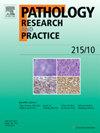Recent update on IGF-1/IGF-1R signaling axis as a promising therapeutic target for triple-negative breast cancer
IF 2.9
4区 医学
Q2 PATHOLOGY
引用次数: 0
Abstract
Insulin-like growth factor 1/Insulin-like growth factor 1-receptor (IGF-1/IGF-1R) pathway is highly breast cancer subtype context-dependent. Triple-negative breast cancer (TNBC) is an aggressive, highly metastatic cancer showing early recurrence and poor prognosis. High expression of IGF-1 and its receptor IGF-1R, their interaction, autophosphorylation, and activation of intracellular signaling cascades have been significantly associated with TNBC pathophysiology. In the last five to seven years, marvelous work has been done to explore the role of IGF-1/IGF-1R axis in TNBC. In the present review, starting from the general introduction to IGF-1/IGF-1R pathway an up-to-date discussion was focused on its role in TNBC pathophysiology. Further we discussed the up/down stream molecular events of IGF-1/IGF-1R axis, clinical relevance of IGF-1 and IGF-1R levels in TNBC patients, anti-TNBC therapy and possible way-out for IGF-1/IGF-1R axis mediate therapy resistance in TNBC. Combination therapy strategy has been researched to overcome direct IGF-1/IGF-1R pathway inhibition mediated therapy resistance and produced promising results in the management of TNBC. The understanding of up/downstream of the IGF-1/IGF-1R axis provide immense focus on the pathway as a therapeutic target. It is expected within the next decade to determine its potentiality, or lack thereof, for TNBC treatment.
IGF-1/IGF-1R 信号轴作为三阴性乳腺癌治疗靶点的最新进展。
胰岛素样生长因子1/胰岛素样生长因子1-受体(IGF-1/IGF-1R)通路高度依赖于乳腺癌亚型的具体情况。三阴性乳腺癌(TNBC)是一种侵袭性、高转移性癌症,复发早、预后差。IGF-1及其受体IGF-1R的高表达、相互作用、自身磷酸化以及细胞内信号级联的激活与TNBC的病理生理学密切相关。在过去的五到七年中,人们在探索IGF-1/IGF-1R轴在TNBC中的作用方面做了大量工作。在本综述中,我们从 IGF-1/IGF-1R 通路的一般介绍开始,重点讨论了其在 TNBC 病理生理学中的最新作用。此外,我们还讨论了IGF-1/IGF-1R轴的上下游分子事件、TNBC患者体内IGF-1和IGF-1R水平的临床意义、抗TNBC疗法以及IGF-1/IGF-1R轴介导TNBC耐药的可能出路。为克服IGF-1/IGF-1R通路抑制直接介导的治疗耐药,人们研究了联合治疗策略,并在TNBC治疗中取得了可喜的成果。对IGF-1/IGF-1R轴上下游的了解使人们更加关注作为治疗靶点的IGF-1/IGF-1R通路。有望在未来十年内确定其在 TNBC 治疗中的潜力或不足。
本文章由计算机程序翻译,如有差异,请以英文原文为准。
求助全文
约1分钟内获得全文
求助全文
来源期刊
CiteScore
5.00
自引率
3.60%
发文量
405
审稿时长
24 days
期刊介绍:
Pathology, Research and Practice provides accessible coverage of the most recent developments across the entire field of pathology: Reviews focus on recent progress in pathology, while Comments look at interesting current problems and at hypotheses for future developments in pathology. Original Papers present novel findings on all aspects of general, anatomic and molecular pathology. Rapid Communications inform readers on preliminary findings that may be relevant for further studies and need to be communicated quickly. Teaching Cases look at new aspects or special diagnostic problems of diseases and at case reports relevant for the pathologist''s practice.

 求助内容:
求助内容: 应助结果提醒方式:
应助结果提醒方式:


